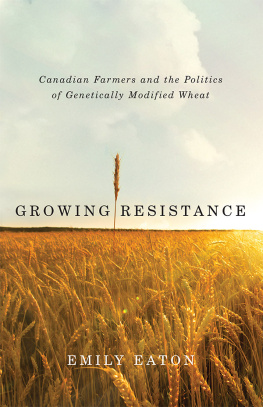Aristeidis Panagiotou - Structure, Agency and Biotechnology: The Case of the Rothamsted GM Wheat Trials
Here you can read online Aristeidis Panagiotou - Structure, Agency and Biotechnology: The Case of the Rothamsted GM Wheat Trials full text of the book (entire story) in english for free. Download pdf and epub, get meaning, cover and reviews about this ebook. year: 2017, publisher: Anthem Press, genre: Politics. Description of the work, (preface) as well as reviews are available. Best literature library LitArk.com created for fans of good reading and offers a wide selection of genres:
Romance novel
Science fiction
Adventure
Detective
Science
History
Home and family
Prose
Art
Politics
Computer
Non-fiction
Religion
Business
Children
Humor
Choose a favorite category and find really read worthwhile books. Enjoy immersion in the world of imagination, feel the emotions of the characters or learn something new for yourself, make an fascinating discovery.

- Book:Structure, Agency and Biotechnology: The Case of the Rothamsted GM Wheat Trials
- Author:
- Publisher:Anthem Press
- Genre:
- Year:2017
- Rating:4 / 5
- Favourites:Add to favourites
- Your mark:
Structure, Agency and Biotechnology: The Case of the Rothamsted GM Wheat Trials: summary, description and annotation
We offer to read an annotation, description, summary or preface (depends on what the author of the book "Structure, Agency and Biotechnology: The Case of the Rothamsted GM Wheat Trials" wrote himself). If you haven't found the necessary information about the book — write in the comments, we will try to find it.
The overarching aim of Structure, Agency, Biotechnology: The Case of the Rothamsted GM Wheat Trials is to propose a way of filling the analytical gap found in the current literature by offering an original theoretical framework. This framework is able to assess both the content and context of the scientific field without resorting either to deterministic or to what theorists refer to as conflationist strategies. In order to demonstrate the heuristic value of the framework, the 2012 GM wheat field trials carried out by Rothamsted Research, often associated with the second push of agribiotech firms to bring Genetically Modified Organisms (GMOs) to the UK, areassessed, and key aspects of the experiment areunderscored. At the same time, the broader institutional arrangements, key ideological constructs and the social order are examined, and a reframing of the controversy which moves beyond the simplistic conceptualization of it being a case of science versus politics is suggested. The volume also proposes a clear set of guidelines, which stem from the methodological and theoretical deep structure of the suggested framework but do not demand prior theoretical knowledge, which can be used by a wider audience engaged with biotechnology. This audience can draw on the guidelines either for reasons of developing a critical understanding of particular situations or for initiating the process of sustained dialogue between involved parties. These two dimensions are of great significance for practical policy orientations.
Aristeidis Panagiotou: author's other books
Who wrote Structure, Agency and Biotechnology: The Case of the Rothamsted GM Wheat Trials? Find out the surname, the name of the author of the book and a list of all author's works by series.











